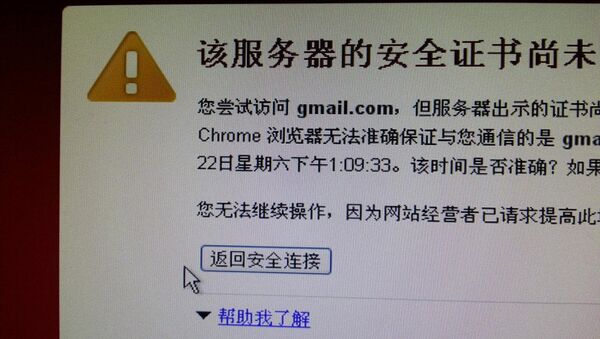MOSCOW, December 29 (Sputnik) - China's internet regulators are said to have blocked access to Google's Gmail service, PC World has reported.
On Sunday, Internet performance monitoring company Dyn Research confirmed that China was blocking Gmail at the IP level, following reports on the social media that the email service had been blocked in the country since December 26. Dyn noted that all of Gmail's IP addresses, based in Hong Kong, have been blocked.
Earl Zmijewski, Vice President of Data Analytics at Dyn, told Mashable that China "has a number of ways [to] block content," and that "one of the crudest ways is just to block an IP address. [When] you do that, you block all the content available at the IP." Dyn's Twitter page confirmed the outage on Sunday.
@DynResearch confirms China #GFW IP-level block of Google's http://t.co/XhsNku2A6Q when served from #HongKong pic.twitter.com/uV3Y8pgHTQ
— Dyn Research (@DynResearch) 28 декабря 2014
The dramatic drop in traffic is also observable on Google's Transparency Report service, which shows a sudden drop in traffic after December 26 following a series of drastic fluctuations, beginning in the middle of December.
The block comes six months after Gmail was blocked in mainland China, with users at that time still being able to access the service using third-party email applications such as Microsoft Outlook and Apple Mail, Reuters explained.
Google, which stopped censoring its search results in China in 2010, has been regularly targeted by China's Internet Information Office ahead of politically sensitive anniversaries and big political conferences. Regulators have regularly targeted services such as Google's eponymous search engine, and banned the use of the social media platforms Twitter and Facebook outright, saying that they could be used as platforms for political destabilization.
Neither the Internet Information Office nor Google have yet confirmed or commented on the block, although a Singapore-based Google spokesperson told the Reuters on Monday that "there's nothing wrong on our end." Chinese Foreign Ministry spokeswoman Hua Chunying noted that she had not heard anything about the service being blocked.

